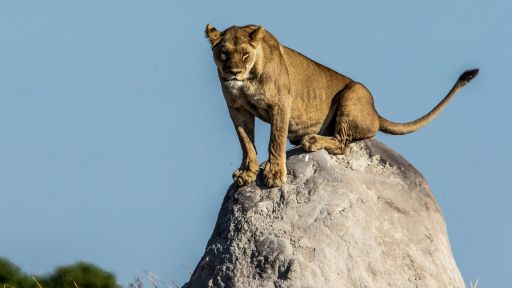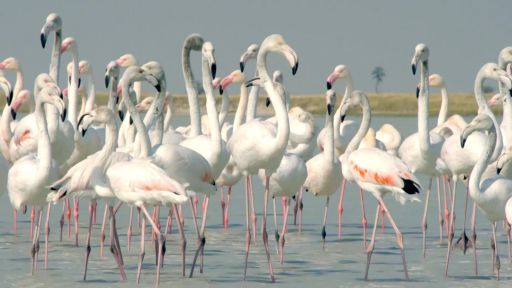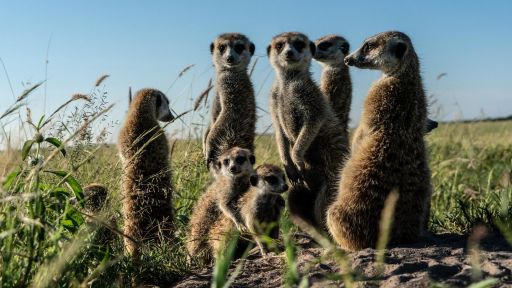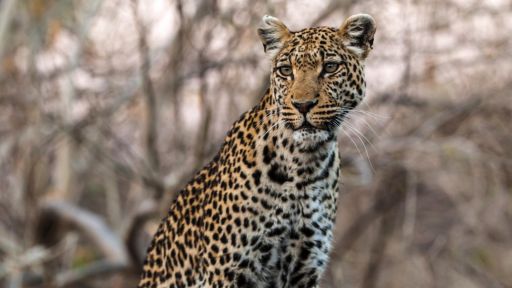Dereck and Beverly Joubert take us behind the camera for the filming of the final episode. They share some of the technical challenges and reflect on the full scale of the project.
Features





(birds singing) - [Dereck] The Okavango, Iconic, dramatic, pristine and wild.
This is our backyard.
It's where we live.
- [Beverly] People think this is a romantic life.
Two people living in the bush.
Exploring.
Getting up close to the wild animals.
What they often forget is that it's work for us.
There are a lot of moving parts, camera gear, vehicles, tracking animals daily, extreme heat, long hours.
But just being with some of Africa's largest killers changes one's perspective.
- [Dereck] There's a huge difference between a shot of a beautiful cat, and a beautiful shot of a cat.
So, we have to work hard.
- [Beverly] Not ever day is perfect, it can get smelly at a carcass like this.
Dusty.
But we wouldn't trade it for anything else.
(birds squawking) It is romantic, as long as you can stay out of danger and hospital.
- [Dereck] While Beverly focuses her still cameras on capturing that one instant, I'm looking for movement, action, changing angles, making sure we get enough shots to cover an entire scene.
- [Beverly] This chapter of the Okavango series deals with the dry fringes of the Delta.
A place where endangered painted dogs thrive.
To capture this we brought in very specialized equipment.
It's called a shot over.
The idea was to get painted dogs on the move.
Casey, Ben, Brad and Dom came in from Montana.
- [Dereck] Well, it's a little hotter out here than in Montana, the bush is different, and to be fair, it was a tall order to follow dogs at high speed in this kind of habitat anyway.
Ultimately we didn't get the scene we were after, but having a shot over there gave us other, unexpected, scenes.
It's often about being ready and having the ideas and tools to adapt quickly.
(dramatic music) - [Beverly] We're still on a quest to understand the Okavango and we just keep returning to the large iconic animals because we love being with them but also because they really make the place what it is.
I call them the landscape artists of Africa.
- [Dereck] I love being with elephants.
There is something about their pace that suits mine.
It's a gentle, moving and ever changing canvas of tolerance, perhaps.
When I'm down on the path of a bull elephant seems to know I'm there.
They probably know how vulnerable I am, but there is an atmosphere of harmony.
If you just allow it to happen.
When it's hot we place remote cameras at the last water.
When it's 120 degrees out here everything moves to that water.
- [Beverly] One day Taylor had some momentary success before someone stole his camera.
Let's just say we started the production with more working cameras than we ended up with.
(lighthearted music) (animal panting) (water lapping) (animal chirping) - [Beverly] While we were doing tons of hours of helicopter aerials.
Taylor, suffering from malaria, was sent out to the desert.
It was brutal for him.
Sizzling heat, extremely dry, very little going on.
But at least no humidity or more mosquitoes.
(birds squawking) (dramatic music) - [Dereck] The thing about these small, hidden cameras is that you don't actually get very much.
The shoot rate is ridiculous.
But every now and then a sequence like this.
And that allows you to just get in closer.
(water splashing) Today, I think audiences want to feel that they are there, actually with us, in amongst the herds.
To be a zebra.
For a different perspective we get up in the air.
We had five drones on the shoot, lost one or two, but the footage is really worth it.
(dramatic music) We combined these different perspectives to show a scene that we have all seen before, Zebras on the move, but in a different way.
Cutting back and forth and using slow motion for effect.
For some shots we used long lenses to compress the scene like when this ghostly elephant comes out of the desert from nowhere.
- [Beverly] It takes nerve to get down low and then to wait for the moment in the path of a giant.
(water splashing) (bird singing) (soft soothing music) It's often the smaller things that give you context and the feel of a place.
- [Dereck] We worked with a group of meerkats that were used to people wandering around them.
We could get up close, but of course we couldn't, or wouldn't, touch them.
They didn't seem to have the same ethical sensitivities as we do.
- [Beverly] For this merry band of meerkats, living in a flat desert, any high ground is an advantage, so I don't think it was anything about me in particular.
(meerkats chattering) Just staying still I suspect.
But each day we went out, I seemed to be their preferred high ground.
I felt a little used, actually.
Ultimately in the far and ancient reaches of the Okavango and here in the Makarikari pans the real view is from a thousand feet above the ground as zebras arrive and wildebeest mull over the choices to make in life.
(dramatic music) - [Dereck] It's about the desert underneath the herds and, not to be cliche, but it's about everything and how some want to use it and others are used by it.
And how someone's paradise is someone else's purgatory.
It is a complex web that makes up this place, this Okavango.
And why we originally chose this song for the title sequence, as weird as everyone first thought it was to put this over a wildlife film.
- [Beverly] In the end the story was one about joy and discovery.
A little are in hospitals and lost gear, some tears, frustration and a lot of laughter.
And in the end, did we find the soul of the Okavango?
- [Dereck] Definitely, I think so.
- [Beverly] Maybe, probably.
Perhaps we'll have to go back.
- [Dereck] Sign me up.
I'm Dereck Joubert, this is Beverly Joubert, I hope that you've enjoyed this journey with us on the Okavango River of Dreams.
♪ Wanna get used by you ♪ Some of them want to abuse you ♪ ♪ Some of them want to ♪ Be abused
